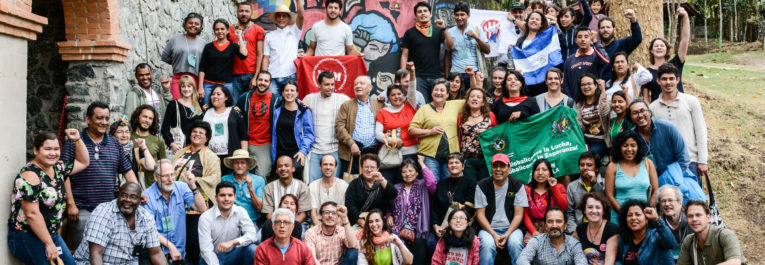Agroecology, a way of life, struggle, and resistance against capitalism!

Lines of work from the Continental Seminar on Agroecological Training, Florestan Fernandes National School, 27 to 30 September, 2017, Sao Paulo, Brazil.
Synthesis
Agroecology: a way of life, struggle and resistance against capitalism. Agroecology is the basis for peasant agriculture and food sovereignty. Agroecology continues to be open to debate and dispute; from the perspective of our movements, it is the guarantee, care and protection of our Mother Earth. For that reason, it is transversal in all the spaces of the land, subsoil, territory, water and space.
The cosmovision and epistemology of our peoples tell us that agroecological practices are the center of our ancestors’ production, since they are the coexistence of all living beings. The land does not belong to us; we belong to the land. We are balance and equity, solidarity, integrity, diversity, territorial defense, the ‘buen vivir’, the dialogue between ways of knowing, expressed through the peasant-to-peasant method.
We do not want sustainable development, we want sustainable life. Agroecology gives our identity back to us. Women played a historic role in the evolution of peasant and indigenous agriculture.
Our processes of agroecological training make use of the Latin American Agroecological Institutes (IALA) training centers, through the learning routes that CLOC-LVC has built in the continent. Agroecology is a multidimensional space of social processes, sharing, culture, and art that we can only find in our territories.
All support processes for agroecology should be led by organizations of peasant families, indigenous peoples, farm workers and family farmers, including men and women, with the greatest possible participation of young people.
Agroecology and peasant seeds are mutually dependent, because agroecology is incompatible with genetic engineering, there can be no agroecology with agrochemicals or with the transnational agribusiness corporations.
The theories of Marx and Engels (including the division between the countryside and the city) and indigenous cosmovisions are similar and complementary in agroecological thought and in the unity between culture and the dialogue of ways of knowing. Our agroecological proposal regenerates agroecosystems, including plant, animal and soil biodiversity, as well as indigenous cultures with their diverse ways of producing in harmony with Mother Earth.
Action Plan
- We declare the creation of the Articulation of Agroecological Training Processes in Latin America and the Caribbean, linked to the Collectives on Training and on Agroecology.
- Our principal task is the training of peasant and indigenous cadres, as well as peasant pedagogical technicians.
- We will carry out exchanges of materials and ideas, to integrate our schools and training processes with processes surrounding peasant seeds.
- We will prepare study material on the key issues of CLOC-LVC, our agroecology and our peasant seeds.
We will create a web platform for socializing these materials and offer online courses for continuous training for our educators and trainees. - We will share our pedagogical and methodological proposals among all the schools, update the map of schools by type and specialty.
- We will carry out, share and publicize the written materials about our different schools, in order to share feedback and bring information to our new schools, sharing the experience of our movement and other international networks.
- We will defend the indigenous cosmovision, ancestral culture, and respect toward our territories, in order to make peasant agroecology more visible in our organizations, and transform knowledge.
- We ratify the campaign Seeds: The People’s Heritage at the Service of Humanity, which recovers native trees, animal breeds and pollinizers.
- From our organizations, we consider Popular Peasant Feminism should be included in the new relationships of power.
- We will promote campaigns for land and territory, food sovereignty, and making our agroecological practices the main tool for cooling the planet. We will conserve biodiversity.
- We will strengthen the Peasant to Peasant methodology with agroecological practices, with a vocation of community service, the territory that defends socialist society for the working people of the countryside.
- We will struggle for Agroecology and Popular Agrarian Reform, the bases of Food Sovereignty and for the ideal of a life filled with history and creativity, bringing us to achieve broad social change. To make a way of life in harmony with nature, independent from the global market and destined to establish horizontal power relations, for human emancipation.
Globalise the struggles, Globalise hope!
